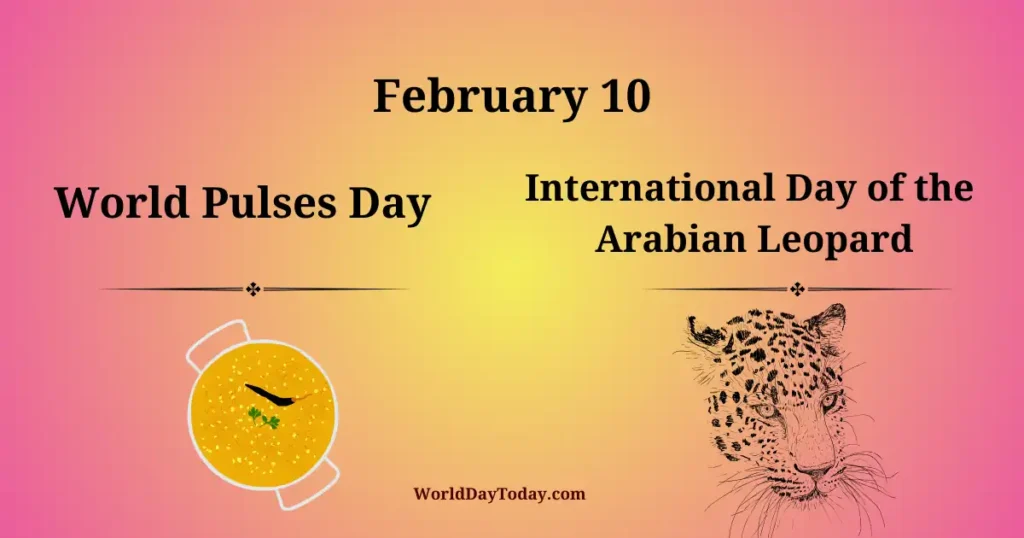10 February
World Day today
10 February World Day Today
Know Todays Day

10 February World Day Today
Table of Content
- World Pulses Day (Read More)
- International Arabian Leopard Day ( Read In More)
A number of important events are held around the world on February 10, highlighting important global issues and celebrating cultural and environmental significance. Two notable international events on this day include World Lentil Day and the International Day of the Arabian Leopard.
10 February World Day Today
1. World Pulses Day
Every year on February 10, the world comes together to celebrate World Pulses Day, an international observance dedicated to promoting the benefits of pulses. Pulses, which include lentils, beans, chickpeas, and peas, are not just staple foods in many cultures but also play a significant role in food security, nutrition, and sustainable agriculture. The United Nations designated this day in 2019 following the successful International Year of Pulses in 2016. The objective is to raise awareness about the health, economic, and environmental benefits of pulses and encourage their increased consumption and production.
10 February World Day Today
1.1 Economic benefits of pulses
Pulses play a crucial role in the global economy, particularly in developing countries where they serve as a major source of nutrition and livelihood. Some key economic aspects include:
- Affordable Protein Source – Pulses provide an inexpensive source of high-quality protein, reducing dependency on costly animal-based protein.
- Boosting Farmers’ Income – Many small-scale farmers rely on pulses as a cash crop, ensuring economic stability in rural areas.
- Reducing Food Import Costs – Promoting local pulse production reduces dependence on imported protein sources, strengthening food security and self-sufficiency.
10 February World Day Today
1.2 How to celebrate World Pulses Day:
Individuals, organizations, and governments can celebrate World Pulses Day in several ways:
- Cooking with Pulses – Prepare and enjoy pulse-based dishes such as lentil soup, hummus, bean salads, or dal.
- Educational Campaigns – Schools and community centers can organize awareness programs on the health and environmental benefits of pulses.
- Support Local Farmers – Purchase pulses from local markets to support small-scale farmers and sustainable agriculture.
- Social Media Engagement – Use hashtags like #WorldDayToday #WorldPulsesDay and #LovePulses to spread awareness online.
- Policy Advocacy – Encourage policymakers to invest in research, production, and marketing of pulses to ensure food security.
10 February World Day Today
2. International Arabian Leopard Day
Every year on February 10, conservationists and wildlife enthusiasts come together to observe the International Day of the Arabian Leopard. This day is dedicated to raising awareness about the critically endangered Arabian leopard (Panthera pardus nimr), a majestic big cat that once roamed vast regions of the Arabian Peninsula but now faces severe threats due to habitat loss, poaching, and declining prey populations. The Arabian leopard is the rarest subspecies of leopard, and urgent conservation efforts are required to ensure its survival.
10 February World Day Today
2.1 How to Celebrate International Day of the Arabian Leopard
- Raise Awareness – Share information on social media using hashtags like #SaveTheArabianLeopard and #ArabianLeopardDay.
- Support Conservation Efforts – Donate to organizations dedicated to protecting the Arabian leopard.
- Educate Yourself and Others – Learn about wildlife conservation and discuss it in schools or community groups.
- Encourage Sustainable Practices – Promote habitat-friendly policies that support wildlife conservation.
10 February World Day Today
2.2 Conservation Efforts
Various organizations and governments have initiated conservation programs to protect the Arabian leopard. Some notable efforts include:
- Protected Areas and Reserves – Several national parks and reserves have been established in Oman, Saudi Arabia, and Yemen to provide safe habitats for leopards and their prey.
- Breeding and Reintroduction Programs – Zoos and wildlife conservation centers, like the Royal Commission for AlUla’s Arabian Leopard Breeding Center, are working to breed and reintroduce leopards into the wild.
- Community Engagement and Education – Educating local communities about the importance of leopards in maintaining ecological balance and implementing compensation programs for livestock losses can help reduce human-wildlife conflicts.
- Strengthening Anti-Poaching Measures – Stricter laws, surveillance technology, and anti-poaching units have been deployed to curb illegal hunting and trafficking.